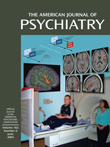Executive Function and Cognitive Subprocesses in First-Episode, Drug-Naive Schizophrenia: An Analysis of N-Back Performance
Abstract
OBJECTIVE: This study investigated changes in the cognitive architecture of N-back performance in schizophrenia. METHOD: N-back performance of 12 patients with first-episode, drug-naive schizophrenia and matched healthy comparison subjects was studied in a reaction-time decomposition paradigm. RESULTS: Imposition of a working memory load led to a significant drop in response accuracy in patients. Reaction-time decomposition suggested slowing of visuomotor and choice reaction processing as well as an inability of parallel processing directed by working memory. DISCUSSION: Although N-back tasks validly access working memory function as a neurocognitive trait in the illness, several additional subprocesses and the ability for cognitive parallel processing are altered and require further study in schizophrenia.



